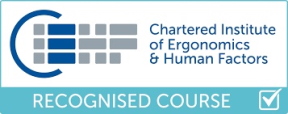Strengthening Organisational Performance – Human Factors in the Chemical and Process Industries, Module Three
Overview
This human factors course provides key pointers for strengthening organisational safety through effective management of training and competence, staffing and workload, supervision and safety, and fatigue-related risk.
This is module three of our Human Factors in the Chemical and Process Industries training programme, which provides practical insight into the key human factors issues facing the industries. You can attend as a one-off course, or alongside our other human factors modules to get a comprehensive overview of the subject.
Learning outcomes
- Understand the consequences of fatigue on human performance and how to manage it effectively
- Understand how to manage staffing and workload effectively
- Understand how to develop and assess competence effectively, and its impact on safety
- Understand what makes effective supervision and its role in performance and safety management.
Who will benefit
- HSE managers and advisors
- Operations managers
- Safety engineers
- Chemical/process engineers
- In-house human factors advisors eg COMAH operators' 'intelligent customers'
Course outline
Managing fatigue
- The consequences of fatigue for human performance
- Managing fatigue using a Fatigue Risk Management Plan
- Fatigue-related performance indicators
- Investigating fatigue-related incidents
Staffing and workload
- Staffing, workload and process safety
- Methods for workload measurement and prediction
- HSE staffing assessment method
Training and competence
- Impact of competence on safety
- Competence management systems
- Developing and assessing competence
- Competence assurance
Effective supervision and safety leadership
- The role of effective supervision in performance management and improvement
- Supervision models – understanding when flexibility is needed and how to achieve it
- Supervision and culture – exploring the links between supervisory behaviour and team and organisational culture
What delegates say
Previous delegates said this course would help them to:
- re-evaluate shift patterns and how to address fatigue
- re-evaluate when (what time of day) they carry out safety-critical tasks
- apply new human factors tools and techniques
- influence others
- assess competencies more effectively
- develop the role of human factors champion
- review/apply their training and competency framework
- improve awareness of human factors within their organisation
- develop a fatigue management system
- understand the staffing assessments to be done by the contractor.
Course delivery
Face-to-face.
There will be some pre-course reading to complete beforehand as preparation for the course.
Dates & location
- 9–10 December 2025, Rugby, UK
Not available then or looking for an alternative course delivery? View more dates.
Fees
- Single module: £2,200 + VAT
- Book all four modules together: £1,650 + VAT per module
Save 20% – use discount code ENDYEAR20 at checkout.
Terms and conditions: discount code can be used on any live online or face-to-face course delivered by 31 December 2025. Applies to both member and non-member rates. Cannot be combined with other offers (eg multi-place discounts). Excludes IChemE approved courses and courses held in South Africa. Registration must be confirmed and paid before the course start date.
In-company training
Our human factors training can be delivered to in-house teams, either on-site or online. This could be a cost-effective option if you have several people requiring the training. Content can be tailored to your specific requirements. Request a quotation.
Attendance certificate & CPD hours
An e-certificate will be issued at the end of the course to confirm attendance and CPD hours logged. Please note that you must attend the whole course to receive the certificate.
In the case of online courses, CPD hours should be used as an approximate guide and will vary depending on the preferred approach of the delegate and to what extent additional learning is completed.
Endorsements

In partnership with:

Associated courses
Managing Human Factors – Human Factors in the Chemical and Process Industries, Module One
Learn about the key human factors concepts within risk management.
Managing Human Failure – Human Factors in the Chemical and Process Industries, Module Two
Learn how to manage human failure effectively to improve overall safety and business performance.
Human Factors in Design – Human Factors in the Chemical and Process Industries, Module Four
Explore the key human factors principles to address at the design stage.

Trainer
Ed Corbett, CPsychol
Head of Human Factors & Organisational Performance, Health and Safety Executive
Ed is a Chartered Occupational Psychologist who heads up the Health and Safety Executive's (HSE) commercial Human Factors and Psychology teams. Working for the national regulator, Ed has a detailed understanding of regulatory requirements and how duty holders can demonstrate compliance. Based at its Buxton laboratory, Ed contributes significantly to HSE’s cutting edge research in human factor and safety science. Before joining HSE, he worked as a consultant and coach across a broad range of industries, specialising in helping organisations develop leadership capability.
Today he combines his regulatory understanding, scientific knowledge and real world experience to help organisations achieve sustainable health and safety improvement. He provides technical human factors support to HSE inspectors on various topics, including competence assurance, has developed competency systems for organisations operating in major hazard sectors, and contributes towards industry guidance. Ed has experience working in various aspects of human reliability, from conducting safety critical task analyses, through to providing input to engineers on equipment/plant design, and development of operational and emergency procedures.

Trainer
James Hayton, CEng, BSc (Psych), BEng, MIET, RAF (Retd.)
Principal Human Factors Consultant, The Keil Centre
James is a Chartered Engineer and Principal Consultant at the Keil Centre with a background in Military Aviation, where he served for 18 years before moving into consultancy. For the past nine years, he has specialised in aviation, delivering training and support in Human Factors, Error and Risk Management, Investigative Techniques, and, most notably, Safety Culture.
Drawing on extensive experience both in military leadership and consultancy, James helps organisations assess safety performance and develop behavioural strategies for change. He holds an MSc in Human Factors and Safety Management, a BSc (Hons) in Psychology, and a BEng (Hons) in Mechanical and Electrical Engineering. He also contributes to EASA’s Human Factors Collaborative Advisory Group and has supported the UK Maritime and Coastguard Agency on Safety Culture.

Trainer
Dr Paul Jackson
Fresh Air Altertness Management
A Chartered Psychologist with over 20 years’ experience, Paul works with organisations involved in safety-critical industries (eg aviation, rail, oil and gas, mining and road transport) helping them to manage workforce fatigue. He has extensive experience of supporting clients with fatigue risk management, including BP, Shell and Newmont Mining. He also conducted fatigue audits at mine sites and oil and gas installations around the world. Prior to that, he was Research Programme Manager at the UK Department for Transport (DfT). He completed his PhD at Imperial College, University of London, he holds an MSc degree in Environmental Psychology and a BSc (Jt Honours) in Psychology and Sociology.

Trainer
Richard Scaife
Director, The Keil Centre
Richard is a Chartered Occupational Psychologist, a Chartered Ergonomics and Human Factors Specialist, a Fellow of the Institute of Ergonomics and Human Factors, and a Chartered Scientist. He has a BSc in applied Psychology, an MSc in Occupational Psychology, and over 30 years of practical ergonomics experience within various industries. Before joining the Keil Centre, he spent six years working for National Air Traffic Services, latterly as the head of human safety in their human factors unit, and four years working on the design of military sensor systems, primarily for aircraft. Richard specialises in all aspects of human factors, particularly organisational safety, human safety analysis (including human error) and incident investigation. He has cross-industry experience, providing consultancy expertise and training. He was awarded the British Psychological Society Practitioner of the Year Award in 2006.